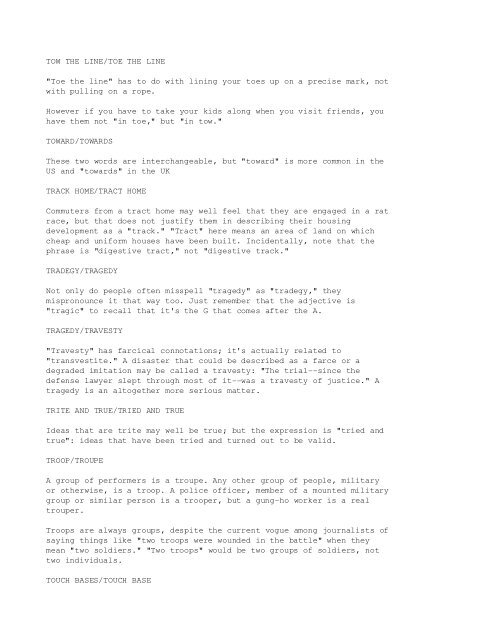Common_Errors_in_English_usage
Common_Errors_in_English_usage
Common_Errors_in_English_usage
You also want an ePaper? Increase the reach of your titles
YUMPU automatically turns print PDFs into web optimized ePapers that Google loves.
TOW THE LINE/TOE THE LINE<br />
"Toe the l<strong>in</strong>e" has to do with l<strong>in</strong><strong>in</strong>g your toes up on a precise mark, not<br />
with pull<strong>in</strong>g on a rope.<br />
However if you have to take your kids along when you visit friends, you<br />
have them not "<strong>in</strong> toe," but "<strong>in</strong> tow."<br />
TOWARD/TOWARDS<br />
These two words are <strong>in</strong>terchangeable, but "toward" is more common <strong>in</strong> the<br />
US and "towards" <strong>in</strong> the UK<br />
TRACK HOME/TRACT HOME<br />
Commuters from a tract home may well feel that they are engaged <strong>in</strong> a rat<br />
race, but that does not justify them <strong>in</strong> describ<strong>in</strong>g their hous<strong>in</strong>g<br />
development as a "track." "Tract" here means an area of land on which<br />
cheap and uniform houses have been built. Incidentally, note that the<br />
phrase is "digestive tract," not "digestive track."<br />
TRADEGY/TRAGEDY<br />
Not only do people often misspell "tragedy" as "tradegy," they<br />
mispronounce it that way too. Just remember that the adjective is<br />
"tragic" to recall that it's the G that comes after the A.<br />
TRAGEDY/TRAVESTY<br />
"Travesty" has farcical connotations; it's actually related to<br />
"transvestite." A disaster that could be described as a farce or a<br />
degraded imitation may be called a travesty: "The trials<strong>in</strong>ce the<br />
defense lawyer slept through most of itwas a travesty of justice." A<br />
tragedy is an altogether more serious matter.<br />
TRITE AND TRUE/TRIED AND TRUE<br />
Ideas that are trite may well be true; but the expression is "tried and<br />
true": ideas that have been tried and turned out to be valid.<br />
TROOP/TROUPE<br />
A group of performers is a troupe. Any other group of people, military<br />
or otherwise, is a troop. A police officer, member of a mounted military<br />
group or similar person is a trooper, but a gungho worker is a real<br />
trouper.<br />
Troops are always groups, despite the current vogue among journalists of<br />
say<strong>in</strong>g th<strong>in</strong>gs like "two troops were wounded <strong>in</strong> the battle" when they<br />
mean "two soldiers." "Two troops" would be two groups of soldiers, not<br />
two <strong>in</strong>dividuals.<br />
TOUCH BASES/TOUCH BASE





